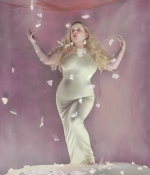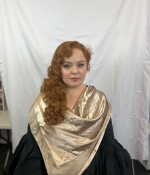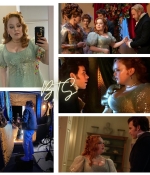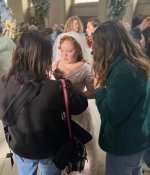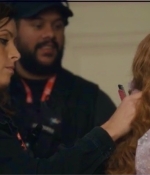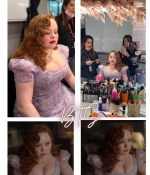A raucous comedy from playwright Camilla Whitehill, “Big Mood” teams “Bridgerton” and “Derry Girls” alum Nicola Coughlan with ‘It’s a Sin’ star Lydia West to dive headlong into mental illness and friendship. Fremantle, heading global distribution, will showcase the project in Cannes as part of its Mipcom slate. The market kicks off Oct.16.
A divinely sardonic and captivating laugh riot, the upcoming Channel 4 series presents an earnest portrait of mania and biologically-induced despair in a world where mental health has been commodified and sanitized for ease of consumption. Whitehill manages a highly nuanced depiction of Coughlan’s Maggie, whose bipolar pendulum swings erratically, as she tries desperately to regain control of her fleeting agency while clinging tightly to longtime friend Eddie, played by West.
“We’ve done a lot of patting ourselves on the back as a society, saying, ‘We’re really facing mental health,’ but we’re not. We’re okay with the stuff that isn’t scary, or that goes on behind closed doors. Mental illnesses that have side effects, or show themselves differently, we’re still just scared of what we don’t understand. Understanding mental illnesses outside of depression and anxiety, and understanding more about how people you know might be affected by the medication they’re on, can only be a good thing,” Whitehill told Variety.
“I’ve always seen people with mental illness portrayed as the dregs of society, detained by law enforcement or just troubled. Seeing someone with a functional life who’s also struggling deeply, it’s so important and it’s amongst all of us, especially in this generation. It’s such a good time for the show to come out, to open up those conversations again and normalize talking about it,” West added.
Directed by Rebecca Asher (“Dead to Me,” “Brooklyn Nine Nine”), the series opens as Maggie cruises down a London road on an electric scooter. Clad in a bright matching jumpsuit, blonde hair wrapped delicately in a chic scarf and face made-up proper, donning oversized sunglasses, her charisma is on full display. As she reaches her destination, she quickly abandons the ride by selling it to bystanders, rushing into the pub to meet Eddie, who calls her out on her rash behavior. The episode quickly establishes the co-dependent dynamic between the two as Maggie coaxes a reluctant Eddie to leave her responsibilities as bar owner behind to accompany her to a speaking engagement she abruptly set up at her old high school. Slyly deviant exploits ensue.
“It would be really hard to fake this friendship. If the friendship between Maggie and Eddie was strained, or you could tell it was a performed friendship, the audience wouldn’t believe it. They wouldn’t be as invested,” West stated.
An audience is likely to not only believe in the pair but become hastily enamored with the whole cast and the tempered chaos that surrounds them. From the tight-knit protagonists brimming with compelling traits, on through to characters on the periphery who pepper the already solid narrative with their own bonkers storylines, all contribute to arcs that beg a binge watch.
Rounding out the dynamic ensemble are Niamh Cusack (“The Virtues”), Eamon Farren (“The Witcher”), Luke Fetherston (“Flowers in the Attic: The Origin”), Kate Fleetwood (“Wheel of Time”), Rob Gilbert (“Big Boys”), Sally Phillips (“Veep”), Ukweli Roach (“Wolf”) and Amalia Vitale (“Willow”).
“This show is so dependent on the supporting actors for creating the world. Lydia and I talked about being on sets that aren’t supportive. How much that can trickle down. I know that we, as the leading actors, really wanted to create that welcoming environment for people coming in,” Coughlan stated.
“I don’t want to sound too saccharin, but it was an incredibly kind set. Everyone felt really supportive and supported,” she added.
Episode two sees Eddie lure a couch-bound and nearly catatonic Maggie out for a short birthday errand which turns into a surprise “Love Actually”-themed celebration at Eddie’s bar where friends spend hours ensuring Maggie doesn’t escape the costume-clad affair and rather, goad her to wade through the pleasantries her family, friends and special guest Joanna Page have in store. The push and pull of her mental illness grips each scene as the bar battles a pest problem and Maggie takes hallucinogens to cope with the anxiety that comes with an impromptu social exchange. The slightly trepidatious way she navigates the world becomes increasingly apparent.






